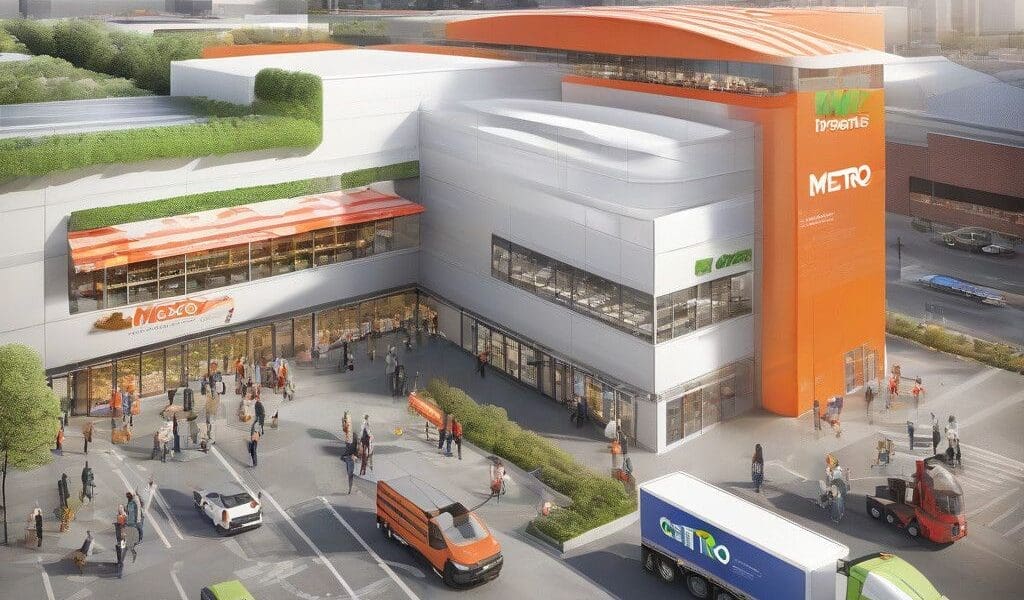Metro Inc. has officially launched its automated distribution center for fresh products in Toronto, concluding a substantial investment of nearly $1 billion CAD aimed at modernizing its supply chain operations. This Toronto facility represents the final piece of a transformative seven-year project that began in 2017, during which Metro has leveraged advanced technology and strategic investments to enhance its logistical capabilities.
The modernization initiative included various key components: the establishment of an automated fresh and frozen distribution center in Terrebonne, Quebec, which came online last year; the expansion of the existing fresh produce distribution center in Laval, Quebec; and the construction of two new automated distribution centers in Toronto, one of which focused on frozen products and opened in 2022.
Eric La Flèche, president and CEO of Metro Inc., outlined the significance of this initiative, stating, “Our new automated distribution centers, along with the expansion of one of our facilities, represent a substantial investment in Metro’s future.” He emphasized that this transformation aims to enhance future growth opportunities while improving overall efficiency and market competitiveness.
The Toronto facility was brought to fruition through a partnership with Witron, a German automation expert that has been collaboration with Metro since the inception of the modernization project. This partnership underscores a commitment to integrating cutting-edge technology into their operations. Dan Gabbard, the VP of logistics and distribution for Metro, highlighted the facility by noting that it serves a crucial role in boosting retail efficiency, thus improving the freshness and quality of food products delivered to their stores.
Metro’s modernization project is designed to achieve several critical objectives:
1. Improved Service: Streamlining processes to enhance service to its store network will reduce handling times and ensure precise order fulfillment.
2. Competitive Efficiency: Continued efficiency gains throughout the supply chain will solidify Metro’s competitive edge in the marketplace.
3. In-stock Position: The focus on precision in order fulfillment is poised to enhance product availability in stores, ensuring that customers find the items they need.
4. Customer Experience: By offering a greater variety of products and ensuring better freshness, Metro aims to enrich the overall customer experience.
5. Sustainable Growth: As customer demands evolve, this modernization can help sustain anticipated growth across Metro’s operations.
The opening of the automated distribution center is a pivotal moment for the company, marking a significant milestone not just in terms of logistics but also in the broader context of food retailing in North America. With 980 food stores operating under various banners—such as Metro, Metro Plus, Super C, Food Basics, Adonis, and Première Moisson—Metro is clearly focused on fortifying its position as a leading grocery retailer in Canada.
In concurrent news, François Thibault, the company’s CFO and Treasurer, recently announced plans to retire in the coming spring. His tenure of over 12 years included pivotal acquisitions and a strong focus on ensuring Metro’s secure financial position. His leadership has significantly contributed to Metro’s strategic direction and success in achieving long-term financial objectives.
Finding a successor for Thibault has commenced with an external search to ensure that the transition is smooth and strategically aligned with the company’s future goals.
Metro operates in the food and pharmacy retail space, employing over 97,000 people across its various business units. It stands as a testament to the growth and adaptability of the food retail sector in an age where efficiency, freshness, and customer experience are essential to success.
Metro’s ambitious modernization effort reflects a broader trend within the retail industry where technology is leveraged to meet the evolving demands of consumers. As warehouses and distribution centers across the globe adopt more automated systems, sectors such as grocery retail are positioned to benefit from reduced operational costs and improved service delivery.
In conclusion, Metro Inc.’s new automated distribution center not only enhances the company’s logistical operations but also sets a standard for other retailers aiming to modernize their supply chains. The combination of technology, strategic investment, and a focus on customer experience positions Metro favorably for ongoing success in the competitive grocery marketplace.











